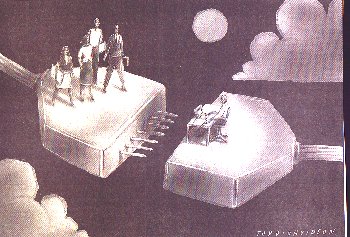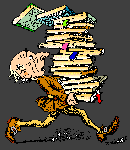| LinkExchange Member | Free Home Pages at GeoCities |
| LinkExchange Member | Free Home Pages at GeoCities |


By Graeme Philipson

|
But at the same time the amount of information is rising. We live in the information age, we are told. The volume of knowledge in the world is doubling every few years (though it would seem that wisdom is still in short supply). How do we reconcile these apparently opposing trends? The key is in what we might call the new literacy. For years now the written word has been humankind's predominant way of storing and recording information. Those three millennia are but a very small part of our existence on this planet. Add to that the fact that printing has been in use for less than 500 years, and that universal literacy through mass education is still only about a century old, and then in only some countries. By any measure, the primacy of the written word is a comparatively recent thing. Its relative decline in the television era is of no great import. While it is fashionable to complain about the literacy levels of schoolchlldnen, and even graduates, there is no evidence that standards are appreciably lower than in the past, a past which in any case stretches back only a generation or three. Television, and now computers, have given the printed word its first competition. When books became widely available after the invention of the printing press, many decried the decline of memory. Over many thousands of years a vast tradition of oral history had grown up, and through the use of various mnemonic tricks and other aids many people had learnt to memorise vast tracts of information. Books, they said, wouId destroy all this, and wreak havoc on the workings of the human mind.
 It is the same kind of people who are now saying that electronic media will destroy print. They are wrong, The electronic media are changing the role of print, which is moving from being the dominant medium of record to being just one of many media of record. Indeed, a sound case can be made that computers are reviving print in some areas. Telephones and sheer laziness have led to a great decline in the fine art of letter-writing over the past century, though it could also be argued that this art was only ever the preserve of the upper classes, and the decline was more than balanced by the increase in correspondence among the masses. Now e-mail has rescued tbe letter. Typing it up and zapping it off is much easier than writing it out longhand, sealing it in an envelope, putting a stamp on it and posting it. As e-mail has become universal in business and widespread for private use, letter writing is undergoing a great revival. Personally, I think this is fantastic, because I write for a living and I love the written word. With e-mail I am in an environment I love and in which I can express myself well, which makes it easier to dominate or at least control the exchange. (I am as much a power freak as the next person.) But e-mail is ephmeral. Once written, it is shot out into the ether, read by its recipients, then deleted or consigned to the nether world of the kept mail folder, there eventually to be erased. E-mail, like written correspondence, leaves no trail unless the author or recipient makes a special effort, which few do.
 There will be few books compiling witty or emotional e-mail exchanges between famous people. That's a shame, but it's also the way it is. I can't image a mechanism that will allow us to keep all this stuff, which on reflection is probably not entirely a bad thing, given that most of it is rubbish or simply the banal minutiae of the everyday. It is hard to see the alphabet dying. The Internet is still largely text-based, and the medium's increasing ease of use is drawing many more people to it all the time. There are plenty of people watching, (or at least seeing), and listening, (or at least hearing). We are awash with communication. It makes no sense complaining about the decline of the printed word. As it becomes just another medium, we are moving to a kind of multimedia literacy; here capability with print becomes no more important, or useful, than capability with image. This is not necessarily a bad thing. There is no rule that says that the written word is superior to other forms of meda. While some of us are print-oriented and will always remain so, there are people growing up in our midst for whom print is of comparatively minor importance.
 The vast majority of these people wil enter adult life as well educated as the generations before them. But they will rely less on books and newspapers, and more on television and computers and multimedia. We are not witnessing the decline of literacy, simply a new literacy. We must not make oral judgments about the superiority of one medium over another. To my mind, there will never be a substitute for the morning paper, (The Sydney Morning Herald, of course) and the well-bound book. To me, television is an occasional medium for live sport and old movies. But I am in a minority that is getting smaller by the day. It's sad, but it's not bad. The world will survive. I am a print nut largely because I am of the last generation that grew up before television. I was raised in Tamworth, and television didn't come there until I was well into high schooL

Last Sunday I connected my son's computer to the Internet for his llth birthday. Just as he now remarks upon the fact that I was a teenager before we lived
in a house with television, so his children will find it quaint that he was nearly that
old before he was on the Net. And what of their Children?
geepee @ ozemail.com.au
|
 Please mail any comments and suggestions to:
robin_knight@bigfoot.com
Please mail any comments and suggestions to:
robin_knight@bigfoot.com

|
HAVE A LOOK AT SOME OF THE OTHER GREAT ESSAYS WE'VE FEATURED!
|

